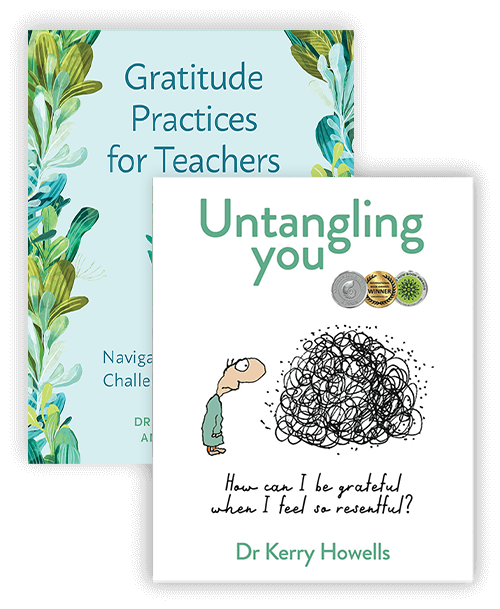If you have ever experienced chronic pain, you will know how it can be totally debilitating and wear you down physically, mentally, and spiritually. It’s hard to keep your hope and optimism alive, as all you can do is put one foot in front of the other. Just getting through your day is a major achievement.
This is how I felt when I had a relatively short experience of chronic pain a few years ago as a result of shingles, where I experienced intense nerve pain in my head for months and months. I had researched gratitude for decades and was well aware of its importance for wellbeing. I also considered myself well-rehearsed in the role of gratitude in adversity and had taught on this specific topic many times. However, when it came to finding gratitude in my own experience of intense suffering, quite simply, nothing worked.
I learned that gratitude requires a strength of mind that is severely diminished when we’re in strong or chronic physical or mental pain. This was a humbling and somewhat shattering lesson for me, having always believed in the power of mind over matter. I also realised that my resentment about what this illness had taken away from me – my health, my ability to work and write, my planned trip overseas – seemed to negate my gratitude.
Resentment – the bitter indignation arising from broken expectations or feeling that we are being treated unfairly – often seems to be the natural response to situations where we feel disempowered, having no control over our circumstances.
We might be resentful about how our dignity and sense of worth in the world is suddenly crushed by the indignity of the disease or disability; the need to depend on others; or about the pity we often don’t appreciate receiving from those who care for us. We’re resentful when those around us are well, or when they complain about our illness because they don’t understand the chronic nature of our pain. We feel frustrated or belittled by the complicated medical systems that are supposed to support us. There might also be self-resentment. We don’t like the parts of ourselves that our illness brings to the surface, but we feel powerless to do anything about it.
However, research shows that resentment can be a cause of ulcers, gastric disorders, heartburn, cardio-respiratory symptoms, cardiac disease, intolerance to exercise, headache, backache, joint pain, insomnia and stress.[i] From my experience of shingles, it was my resentment that was making my condition worse and making it harder for me to recover. It made me tense, depressed, and stuck. It gave the nerve pain a stronger grip.
Although it might seem unattainable, one of the most powerful ways to address resentment is to practise gratitude. This is because they are opposite states of being, and where there is gratitude, it is difficult for resentment to take hold. We can see these opposites play out. Resentment has us turning inwards and isolating ourselves from others; gratitude gives us a sense of belonging and connectedness. Resentment makes us ruminate about what has been taken away; gratitude helps us see what we have been given. Resentment shuts us down and emphasises what we are lacking; gratitude opens up possibilities. Resentment has us pushing away from reality and blaming ourselves and others around us; gratitude brings a gentle acceptance that helps us to be more forgiving and less judgmental.
Note here that I am recommending that we practise gratitude. It isn’t a matter of waving a magic wand and replacing feelings of resentment with feelings of gratitude. Gratitude is an action, not just a feeling. We could start by taking up one gratitude action that we can do consistently over time and approach it in a step-by-step way. We let go of any tendencies towards trying to do this perfectly, or for this to be another thing we beat ourselves up about because we aren’t ‘doing it right’.
Most importantly, each time we make a move out of our resentment, we are moving towards gratitude. Therefore, each of these actions is a gratitude practice in itself. Think about gratitude as not only the traditional construct of a warm expression of thanks but also as any proactive step you take to address your resentment.
One of the most powerful gratitude practices we can take up is to identify our resentment. It is often hidden, or we have just accepted it as a natural and reasonable response to a very challenging situation. By naming it and recognising the negative ways it is impacting on us and those around us – and in particular, how it might be contributing to our pain – we are able to loosen its hold over us.
Another characteristic of resentment is that it makes us feel powerless over the way we respond. This only adds to the sense of powerlessness we already feel in the midst of our chronic illness. Gratitude, on the other hand, can lead us to realising that we have a choice about how we are going to respond. If we can grow our awareness of the choices we are making, we can reflect on whether we are choosing to respond from an inner attitude of gratitude or resentment.
Not only is it true that every time we move away from resentment we are moving towards gratitude, but also the reverse applies. Every time we move away from gratitude, resentment can more easily take hold. It is therefore important that we find ways of being as vigilant as possible to allow gratitude to be the stronger force in our lives. We can do this by building our gratitude for things we can be grateful for, rather than trying to look for gratitude in the pain itself – which can be impossible much of the time. This will be different, depending on our circumstances, but it could be gratitude for nature, our children or where we live, for example.
In this way, we are growing our resilience and allowing our gratitude to give us the many physical and psychological benefits it has to offer. The most important of these is its power to keep resentment at bay.
I explore this topic more fully in a recent interview with Lauren Zalewski available here on this YouTube. Lauren offers brilliant resources through her website gratitudeaddict.com and a very supportive Facebook community “Attitude of Gratitude with Chronic Pain” You can also discover more in my book, Untangling you: How can I be grateful when I feel so resentful?
[i] Leon-Sanz, P. (2013). Resentment in psychosomatic pathology (1939–1960). In B. Fantini, D. M. Moruno, & J. Moscoso (Eds.), On resentment: Past and present (pp. 150–160). Cambridge Scholars Publishing.






